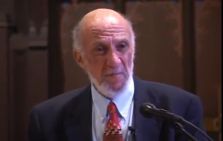 Everything you need to know about today’s coverage of Israel and the Mideast. Join the Israel Daily News Stream on Facebook.
Everything you need to know about today’s coverage of Israel and the Mideast. Join the Israel Daily News Stream on Facebook.
Today’s Top Stories:
1. UN talks on the international weapons trade have stalled over Palestinian participation; AFP reports that diplomats are using the Palestinians to water down the agreement:
While the Palestinians have sought to bolster their international presence by asking for full UN membership, some diplomats indicated the move could be a tactic by Egypt and others to weaken the treaty.
“Certain states, fearing an arms trade treaty with strong human rights provisions, are exploiting the legitimate Palestinian cause,” said a Western diplomat condemning Egypt’s action.
At this point, I’ll tie in Time magazine. Reporter Simon Shuster tagged along with a Syrian delegation visiting a Russian arms bazaar. If you’re looking for assault rifles, tanks, cruise missiles (!) or rocket launchers, “the deceptively titled Forum of Technologies in Machine Building” near Moscow is the place to go:
It was, however, impossible to tell what, if anything, the Syrians purchased. Those deals are struck behind closed doors. But if they did end up buying the assault rifles or armored vehicles that they spent hours studying on Thursday, it would cast serious doubt on the official line from the Russian Foreign Ministry, which has said that only defensive weapons, like antiaircraft missiles, are being sold to Syria, none of which could be used against civilians. The “house-to-house” capabilities that Vishnyakov touted at the Kalashnikov exhibit undermined the ministry’s claim.

2. With the Syrian death toll now averaging 800 a week, you’d think the agenda for yesterday’s UN Human Rights Council meeting would be a no-brainer. Think again. UN Watch and AFP were in Geneva to watch the festival of idiocy and Israel-bashing.
Special guest appearance by UN rapporteur Richard Falk, who called the Mideast peace talks “a trick” and denounced “Israeli apartheid.” This snippet from the UNHRC’s statement sums up the pious fraud:
Syria, speaking as a concerned country, said that the Israeli forces continued their violations in a systematic and persistent manner. The Council and the Office of the High Commissioner must not remain silent before such practices and should not be put under pressure by the State committing State terrorism.
Bottom line: The UN’s fixation on Israel and the Palestinians gives Bashar Assad a free pass to slaughter Syrians.
3. AP: Kenya busted two Iranian Revolutionary Guards agents planning a terror attack that likely targeted Israelis:
The officials said Monday that the plot appears to fit into a global pattern of attacks or attempted attacks by Iranian agents, mostly against Israeli interests.
Kenyan security forces arrested the Iranians in June and were led to 15 kilograms of RDX, a powerful explosive, in the coastal city of Mombasa. Several hotels on the coast are Israeli-owned.
In 2002, Al-Qaida blew up Mombasa’s Paradise Hotel and tried to shoot down an Israeli plane — an attack which even the BBC called terror.
Follow Up
• I’m happy to say The Independent removed a misleading photo from an article about Palestinian minors — a photo that Yarden Frankl dissected just yesterday. If you haven’t seen it yet, watch the video.
• In yesterday’s Israel Daily News Stream, I noted that Time categorized an article about Yitzhak Shamir as “Palestine.” Time fixed the mistake.
Israel and the Palestinians
• Following up on Haaretz‘s revelation that Israel sought a massive IMF loan for the PA, the Asia Times talked to Israeli and Palestinian officials:
. . . its precise significance is hard to gauge at this point. It could be, for example, that the PA, which has experienced a worsening financial crisis for over a year, is truly on the verge of financial collapse; this possibility brings up alarming scenarios involving chaos and violence.
Alternatively, it could be that the Israeli request at the IMF is a confidence-building measure of sorts, a step designed to both create a sense of urgency and to demonstrate that Israelis and Palestinians can work together, including by sharing considerable financial responsibilities. At a time when the relationship between Israel and the PA is chilly and the Palestinians are plagued by systemic economic and financial deficiencies, this step involves a sizeable financial liability for Israel and demonstrates goodwill very clearly.
• Reuters and the NY Times picked up on Hamas cancelling voter registration in Gaza. It’s a big dent in Palestinian unity, but Hamas and Fatah prefer the status quo.

